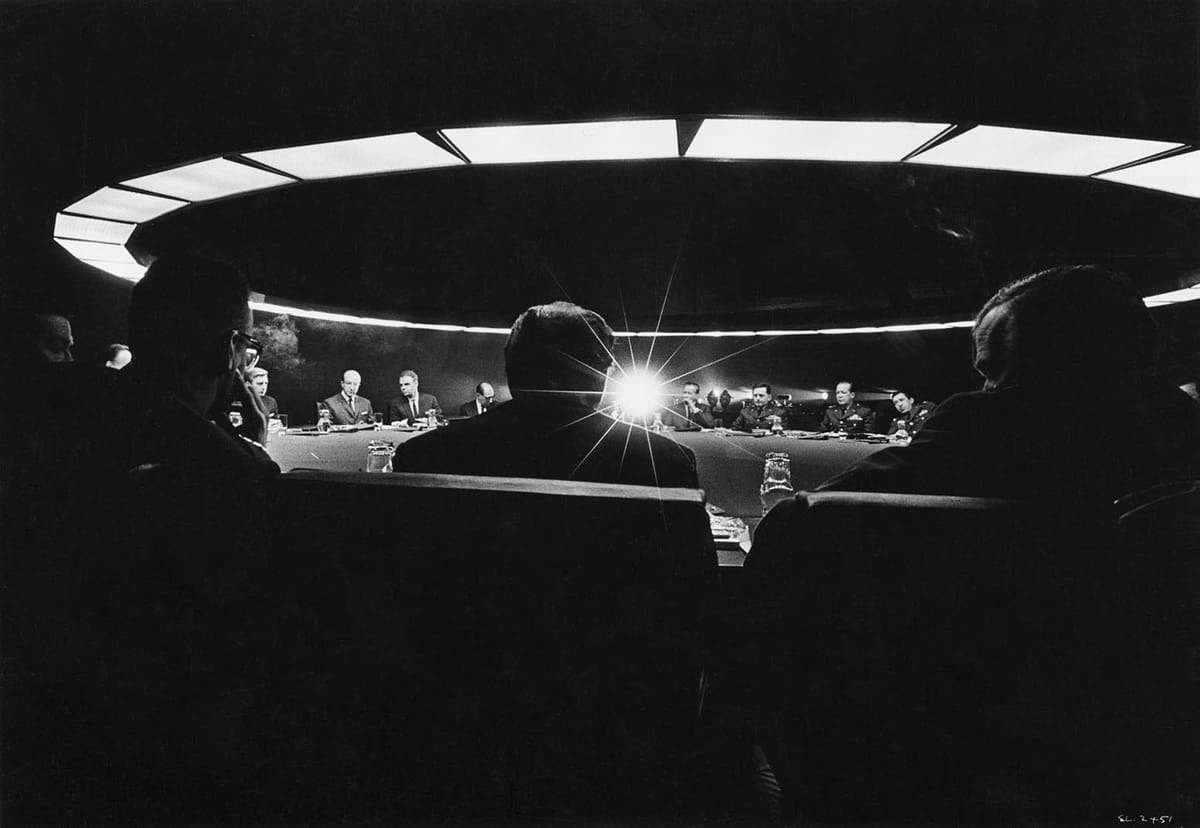Indignity Vol. 2, No. 18: How we stopped worrying.
FOREIGN AFFAIRS DEP'T.

A Blast From the Past
AFTER THE CHILDREN’S lunches were packed, I ate a scone and looked out the window. Late yesterday, the weather forecast had added a chance of overnight snow squalls because the oncoming cold front was so strong, but there was no sign of snow. I registered the snowless pavement, the clean tops of cars, and then, moving down some mental checklist, I registered the fact that we hadn't been hit with a nuclear warhead overnight.
Nuclear annihilation, or thinking about the chance of nuclear annihilation, is back. The real experts said all along it was never gone. It was an important thing to know: the weapons, if reduced in number, didn't go anywhere, and the whole apparatus that keeps them from launching is still cycling away, with the opportunities for technological error or human error continuing to accumulate.
But it seemed to be a latent threat, like the Cascadia earthquake or the Yellowstone supervolcano. I grew up in the last cohort of Cold War children; all-out nuclear war with the U.S.S.R. was still an active possibility, but the old days of duck-and-cover classroom drills, when boomers trained to be active participants in the civic life of the apocalypse, were long over. The middle school rolled out the television carts and we sat on the carpeted floor (designed for spontaneous informal learning but marked off with masking tape as a do-not-enter zone during class changes) and they showed us "The Day After" on videotape. We were in the New York–to–Washington corridor and right next to an Army base, so the question of how Midwesterners might face the consequences of a nuclear strike seemed abstract. On the day after, we would be gone.
Today, the threat is slightly less latent than it was a week ago. So far, nothing Vladimir Putin has said about NATO and Ukraine seems much more belligerent and unhinged than what Donald Trump said about North Korea facing "fire and fury and, frankly, power, the likes of which this world has never seen before." Trump was too ignorant and stupid to understand that we don't use nuclear weapons—that American war policy rests on a scaffold of belief and pretense that our armaments are of course not really armaments, that we have spent more than 75 years building and refining and maintaining nuclear explosives that will never explode.
Along the way, like God creating a rock so heavy He couldn't lift it, we made ourselves so well-armed we couldn't possibly win a war. We poured unimaginable amounts of money into tanks and warplanes and aircraft carriers to show how fully committed we were to not using our most powerful weapons. We chose to fight wars against enemies too diffuse to meet head-on with conventional forces, let alone to threaten with nuclear targeting.
The idea that Russia's war against Ukraine might escalate to a nuclear crisis is terrifying from a normal human point of view, but somehow reassuring to the militarized American collective psyche.
Regime change: Russia.
— Benjamin Wittes (@benjaminwittes) 12:47 PM ∙ Feb 27, 2022
"Regime change: Russia," tweeted Benjamin Wittes, a Brookings Institution fellow and the editor of the Lawfare blog (motto: "Hard National Security Choices"). Presumably Putin had more stressful things on his mind over the weekend than what institutionalist wonks were typing on Twitter; even so, it was alarming to see a national security pundit fantasizing in public about the overthrow of the leader of a nuclear-armed superpower in the middle of a war.
For the benefit of anyone who is actually confused, rather than shilling for Putin, I do not believe in US military involvement in the conflict in Ukraine and have never advocated anything of the kind—much less for the US engaging in forcible regime change in Russia.
— Benjamin Wittes (@benjaminwittes) 3:47 PM ∙ Feb 27, 2022
Wittes went on to clarify that he did "not believe in US military involvement in the conflict in Ukraine and have never advocated anything of the kind—much less for the US engaging in forcible regime change in Russia" and that he simply meant "it’s time to not consider Putin’s continued rule an inevitability." It would, in fact, be nice if Vladimir Putin were not in charge of Russia. It would probably make things better, unless it made things worse.
But why express that thought in the language of American imperialism, and failed American imperialism, at that? "Regime change" is by now a byword for the specific thing that no amount of stockpiled nukes can bring about: getting a country to rule itself in some different way, based on the say-so of the United States. As Cuba and Iran have demonstrated, as soon as the Americans make regime change a policy goal, then sustaining the regime becomes a de facto matter of sovereignty.
That is mostly academic, because the United States is not even theoretically in charge of resolving the situation in Ukraine. The invasion has put Americans—imperialists and anti-imperialists alike—disorientingly far away from our assumed role as the protagonists of world events. This is literally incomprehensible to some people. NBC's chief foreign correspondent, Richard Engel, chose to tweet this today:
Perhaps the biggest risk-calculation/moral dilemma of the war so far. A massive Russian convoy is abt 30 miles from Kyiv. The US/NATO could likely destroy it. But that would be direct involvement against Russia and risk, everything. Does the West watch in silence as it rolls?
— Richard Engel (@RichardEngel) 7:36 PM ∙ Feb 28, 2022
Perhaps the biggest risk-calculation/moral dilemma of the war so far. A massive Russian convoy is abt 30 miles from Kyiv. The US/NATO could likely destroy it. But that would be direct involvement against Russia and risk, everything. Does the West watch in silence as it rolls?
But that, wrote the chief foreign correspondent of NBC News, would be direct involvement against Russia. Whether the United States should launch a direct military-on-military attack on Russian forces—the definition of the beginning of the end of the world, for longer than Richard Engel has been alive—would be a "moral dilemma." Here may be the most horrifying feature of our long nuclear age: it has rotted people's ability to understand what the nuclear age even means.

ENGLISH DEP'T.
A Reminder, From Your Friends
IN RECENT DAYS, our automated Substack subscriber-management system has been emailing some of our most loyal subscribers—dating back to the days when Indignity was operating as Hmm Weekly—to tell them their subscriptions are going to renew. We wanted to take a moment to thank them for their ongoing support of Indignity, but also to apologize for the fact that the email opened with "This is just a friendly reminder."
We do feel a great deal of friendliness toward our readers, a spirit we hope we convey with every installment of Indignity. But "friendly reminder" is, in our experience of reading contemporary American English, a self-nullifying expression. It is an ever more common stock phrase in an ever more passive-aggressive culture, whose connotative meaning is "unfriendly reminder."
Not everyone reads it this way! Many people—presumably including whoever wrote the stock Substack reminder message—send out emails that use "friendly reminder" because they simply wish to remind someone of something in a friendly manner. If you do this, we accept it (after a brief flinch) in the spirit it was intended.
But coming from other people (and institutions), "friendly reminder" is a translucent expression of hostility. By adding "friendly" to "reminder," they are signaling that the friendliness is not a given—that they are choosing, for now, not to be annoyed by the fact that you needed to be reminded of something, even though they already told you about it. They are making sure to introduce doubt into your relationship.
Some people can't resist tipping their hand in interactions like this. They preemptively forgive you for inconveniencing them, or apologize for snubbing you, when you hadn't even registered the potential for offense. These people think they are going around being nice and considerate, while they quietly process every social interaction as a transaction of resentments and hostilities, and inadvertently keep broadcasting that fact.
Our pledge to you, our readers and customers, is that Indignity will always make its hostilities overt. We are here to write for you, in the hopes you will give us money. Our future emails will simply use "reminder." Thank you again for your goodwill and support.





